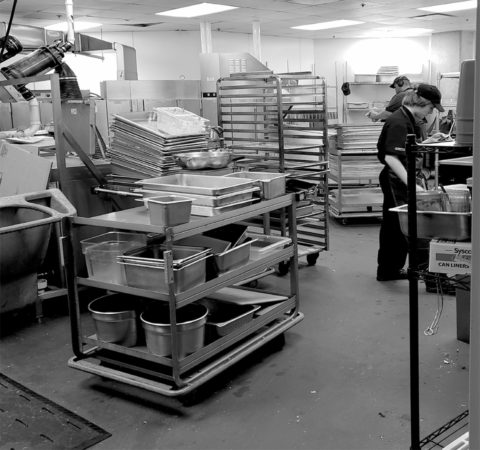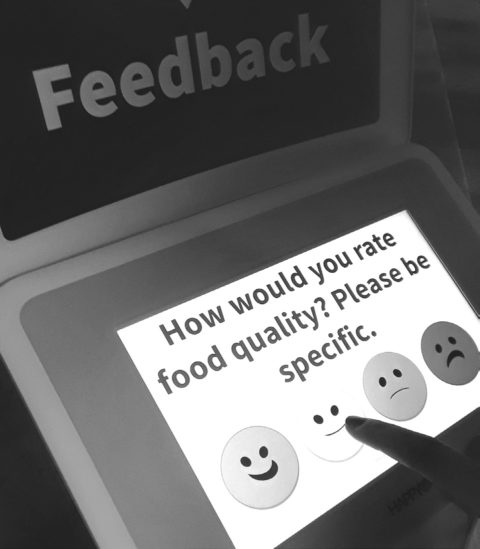Dining Services on campus encourages student feedback
April 15, 2019
Dining Services is the food provider to the UW-River Falls campus, available to students at the University Center. There have been several changes to Dining Services over the last decade, including new management, inclusive menu options and an updated system for students to provide feedback. UW-River Falls is currently contracted with Chartwells, which is a food service firm.
Cara Rubis, the sirector of University Center and Dining Services, explained the partnership with Chartwells is designed to, “[P]rovide residential, retail and catered dining options for the university community. Chartwells currently operates at 280 universities around the country.”
The mission of dining services, as stated by Rubis, “The goal is to create a total dining service program that meets the needs of a diverse student body, faculty, staff and guests on campus. The university and Chartwells (our dining service contractor) work cooperatively to complement the mission of the university and to enhance campus life.”
To achieve this mission, there are numerous standards and guidelines in place to ensure food quality and cleanliness. Staff are expected to be trained in food preparation and storage. According to Rubis, “Associates are trained on receiving practices, proper food storage, safety and sanitation, such as monitoring food temperatures, production levels, hand washing, avoid cross contamination, and other best practices for food preparation operations. Managers and supervisors are also ServSafe certified.” ServSafe is an agency administered by the National Restaurant Agency, or NRA, to guarantee consumer safety.
Health inspections are regularly performed one to three times a year by the county. Chartwells also contracts with a food safety company called Ecosure, which provides food safety assessments and additional training to minimize risk. Food temperature is tested every two to four hours so bacteria does not form. Refrigeration temperatures are also checked twice a day.

Employees utilize sanitized water to wipe down all areas, including furniture. “Associates utilize a pre-measured system to dispense and fill sanitizer buckets at the start of each shift. Buckets are changed out throughout the day to ensure water maintains proper pH levels for wiping down contact surfaces such as tables and counters,” said Rubis.
UWRF has a mandatory meal plan for traditional freshman and sophomore students, encouraging use of the facilities the campus offers.
Riverside Commons, a buffet-style cafeteria, is one meal option for students, located in the basement of the University Center (UC). Former staff described their experiences working in Riverside Commons.
Keira Kapfhamer is a freshman student who worked for dining services in the fall of 2018. During this time, Kapfhamer was responsible for cleaning tables and filling beverage dispensers. She described her overall experience as “eh.”
“My main job was to clean tables and the weekends were very slow, and honestly a bit boring. I left because I found a better job opportunity,” Kapfhamer said. “For what I did, I feel that the pay was the best aspect of the job.”
In comparison to Kapfhamer’s experience, other employees found their duties overwhelming. Kapfhamer commented that there was likely an unequal distribution of labor. Kapfhamer said, “To be completely honest, I would say the atmosphere was somewhat an unhappy one. It didn't seem like many people really enjoyed working there, so not many people seemed to be content with their jobs.”
Kapfhamer was not the first to leave dining services after only a semester. Another former employee, freshman Sam Elam, worked for dining services 20 hours a week this past fall semester. Elam worked as a dishwasher. “It kind of made it feel like we were robots because of how many hours they were forcing us to do. They were pushing twenty hours for most students, which is the maximum hours you could work,” she said.
According to Rubis, there are currently 139 associates on staff, which is a combination of full time, part time, and student associates. Rubis added, “Chartwells is always actively recruiting to add talented team members to the Chartwells team.”
However, some employees felt that although there were enough staff, work distribution was still an issue. “I felt overworked,” Elam revealed. She shared an anecdote about her firstdays working.

“We had no training at all. They threw me on unloading and said ‘match these up with the other ones that are similar, and here you go.’ It was just mainly us students not doing a very good job cleaning up after ourselves. We barely had any supervision. Everyone was so busy working, trying to keep up, that there was no one watching us. It was just students trying their best. I wish they had someone there, just doing the dishwashing supervising and making sure everything was going smoothly,” Elam said.
As a dishwasher, Elam revealed how a “good enough” mentality may have occurred. “I think it’s just workers trying to get the job done as fast as possible because of the demand. And they’re just saying ‘oh, this is good enough’ and just throwing it out there. I’ve gotten spoons with napkins dried on them. It’s gross, I get it.” She believes that staff could still do a better job. “[It] should be to the best of their abilities, because we’re paying for this. It’s coming out of our tuition, so weshould have the best.”
There was a recently a survey system put in place. Rubis explained, “[W]e rely heavily on the feedback of our customers in order to better understand their needs, and to point-out where we fall short of meeting those needs. [. . .] Overall, surveys assist in moving our dining program forward, and help guide decisions and changes as we make our move forward.”
The feedback from the students is shared with the Chartwells management team, which can then review menus and operations to accommodate requests. “Some items may not be available due to seasonality, for example, some kinds of fresh fruit, but the team tries to address any issues or menu requests that can be accommodated as quickly as possible. This can be challenging,” said Rubis.
With almost 2,700 students on a meal, dining services depends on the feedback of students in order for them to provide a quality experience for a wide range of preferences. Students are encouraged to take the dining survey near the exit of Riverside Commons. There is also a detailed complaint process outlined on the university website under Student Affairs.
